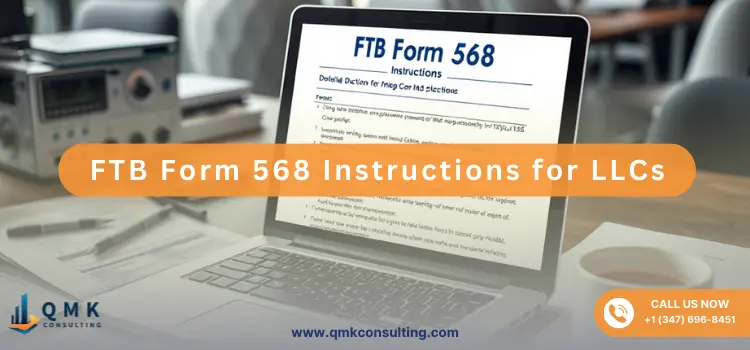
April 23, 2025 |Franchise Solutions


Operating an LLC in California has its own particular obligations—particularly when it comes to taxation. Regardless of whether you're a novice entrepreneur or an old pro, being capable of filing Franchise Tax Board Form 568 accurately can spare you from committing expensive errors, paying fines, and plenty of frustration.
In this guide, we will go over what FTB Form 568 is, how to fill it out step by step, the most common mistakes business owners make, and tips to stay compliant—all explained in a way that's easy to understand. Let's get started.
FTB Form 568 is a yearly return for LLCs doing business in California, regardless of whether the business earned no income during the year. The form will report your LLC's income, compute the LLC fee based on gross receipts, which is required, and allocate income to individual members.
California requires this form from single-member or multi-member LLCs. And skipping it? That’s a fast track to fines and unnecessary audits.
Here are the must-know deadlines:
If you don’t meet these deadlines, you could face penalties, interest, or even suspension of your LLC.
Here is what you will need to complete the form—and how to do it right.
This section contains general information: LLC name, address, FEIN (federal tax ID), and California Secretary of State (SOS) file number. Also, check if it's a final or amended return.
Here you report your gross income, cost of goods sold, and deductions for salaries, rent, and other business expenses. Keep this straight—misreporting income is one of the largest red flags for audits.
Schedule K reports total income and deductions for the LLC. Schedule K-1 breaks out each member's proportionate share. If you're a multi-member LLC, you're required to give each member a copy of their K-1 for their personal tax return.
If any members are not California residents, use this worksheet to calculate the percent of their income earned in-state. This is a very important step for non-resident members and will affect their state tax liability.
If your gross receipts exceeded $250,000, this is where you calculate your extra LLC charge. Get it right—underreporting of your receipts or misfiguring the fee results in penalties.
Even experienced entrepreneurs can go wrong here. Some of the most frequent mistakes include:
Misreporting Gross Receipts: This affects your company's fee. Review your accounting records carefully and make sure to report all earnings.
Forgetting to Attach All Schedules:
Every relevant schedule (K-1s, IW, etc.) must be included. Missing attachments can delay processing or trigger notices from the FTB.
Filing Late or Under the Wrong Entity Type:
Confirm whether you’re filing as a disregarded entity (single-member LLC) or a partnership (multi-member). Filing under the wrong category can mess up your compliance status.
Not Paying the LLC Fee:
Don't mix up the $800 yearly tax with the gross receipts-based fee.
At QMK Consulting, we work with a lot of restaurant and franchise owners across California, and here’s what we tell our clients:
You still need to file Form 568 and pay the $800 minimum tax.
Yes. Single-member LLCs are considered “disregarded entities,” but they still must file Form 568.
You still need to file a final return and indicate it on the cover page of Form 568.
Yes. Just check the “Amended Return” box on the cover page and resubmit with corrections.
Not directly through the FTB, but you can file it electronically through approved tax software providers or with the help of a tax professional.
If you’re a California LLC owner—especially in the restaurant or franchise space—and you want to avoid common tax pitfalls, we’ve got you covered.
Book a FREE Profit & Cash Flow Analysis with Mohamed Karmous, our restaurant accounting advisor and franchise expert at QMK Consulting.
QMK Consulting is a full-service accounting firm based in New York City, serving clients nationwide with specialized services in bookkeeping, tax preparation, financial strategy, and franchise consulting.
Let’s get your business in shape—financially and operationally.